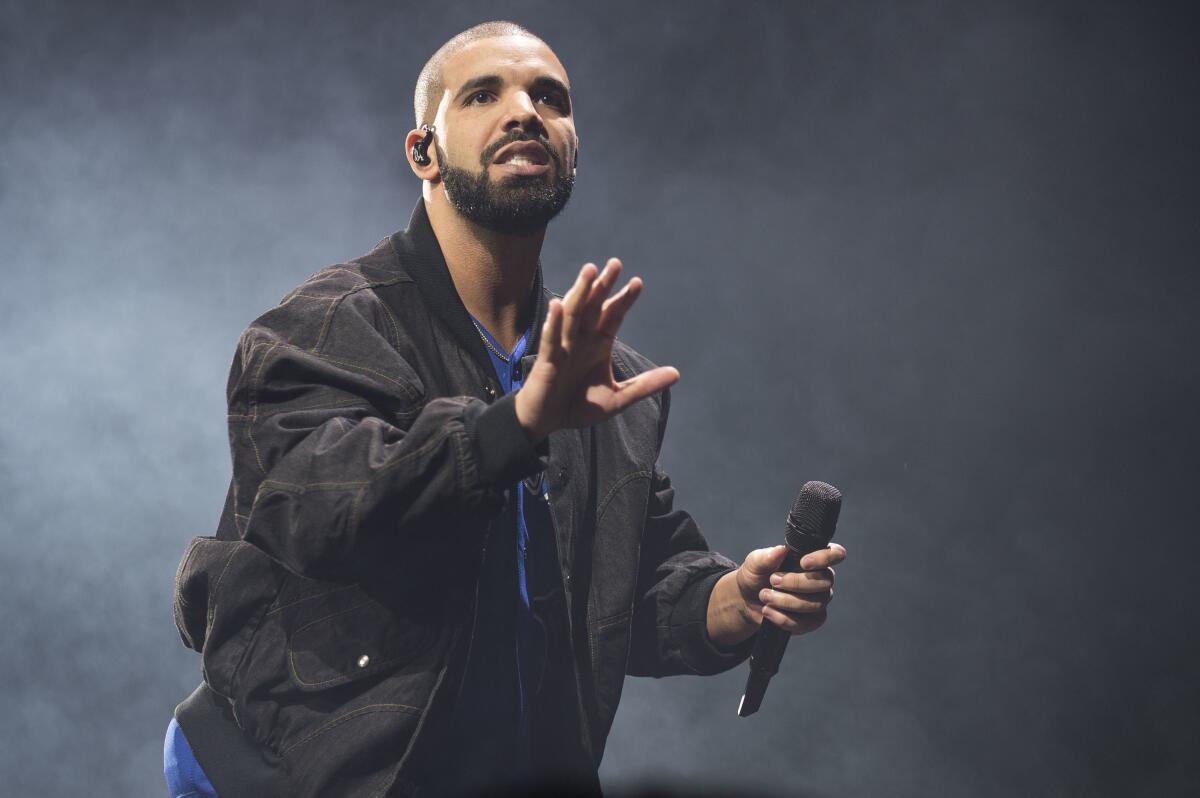Senators draft policy aimed at deep fakes of Drake, Tom Hanks and noncelebrities

- Share via
Late last month, Tom Hanks warned fans that a video in which he appeared to shill for dental care was in fact an AI-generated fake.
And back in April, a song featuring artificially intelligent mimicry of Drake and the Weeknd went viral.
Both cases illustrate the growing threat that machine-generated voice and video clones pose to brand-conscious entertainers. Now, they’re also being cited by a bipartisan group of senators pitching a draft policy that would seek to rein in so-called deep fakes.
The draft legislation — called the Nurture Originals, Foster Art, and Keep Entertainment Safe Act, or NO FAKES — would give both celebrities and ordinary people a legal recourse for the unauthorized AI replication of their likeness, per a discussion draft of the act.
People who’ve had their voice or image replicated without their consent by artificial intelligence software could, under the act, sue for damages against both the creator of the AI clone as well as any platforms that knowingly hosted, published or distributed it, according to the discussion draft.
The draft also includes a number of 1st Amendment-related exceptions, including the use of digital clones for news, sports broadcasts and documentaries, as well as in cases of “comment, criticism, scholarship, satire, or parody.”
“Generative artificial intelligence has opened doors to exciting new artistic possibilities, but it also presents unique challenges that make it easier than ever to use someone’s voice, image, or likeness without their consent,” said Sen. Chris Coons (D-Del.), one of the co-sponsors of the draft, in a written statement. “Creators around the nation are calling on Congress to lay out clear policies regulating the use and impact of generative AI, and Congress must strike the right balance to defend individual rights, abide by the First Amendment, and foster AI innovation and creativity.”
Coons is joined in his sponsorship by Sens. Marsha Blackburn (R-Tenn.), Thom Tillis (R-N.C.) and Amy Klobuchar (D-Minn.).
The discussion draft is meant to lay out general principles of what the lawmakers think legislation on the issue ought to look like, while also serving as a call for feedback, said a person with knowledge of the draft text who was not authorized to speak publicly. The individual added that the legislators aim to introduce a bill based on the draft language in the coming months.
Although household names such as Hanks, Drake and the Weeknd are emphasized in the senators’ proposal, the legal recourse in question would extend to noncelebrities too.
“We don’t want movie studios to be able to replace a living actor with an AI-generated version of that actor,” the knowledgeable individual said. “We don’t want people sitting in their basements to be able to create songs that sound like Drake … and then ship that out to streaming platforms. … But at the same time, we also don’t think that that should be exclusive to famous people.”
Under the currently proposed draft language, creators of AI clones would not be able to defend themselves by simply labeling their work as unauthorized.
Concerns about the unauthorized replication of individuals’ likenesses have been around for years, focused largely on the use of AI to create “deep fake” imitations of politicians and A-listers. But a recent explosion in the quality and accessibility of AI software has made the issue more immediate, prompting individuals and labor groups to push back.
SAG-AFTRA, a labor union representing actors and other performers, is currently on strike over a variety of industry issues, including concerns about the way AI clones will be deployed by film and television studios. The guild has been pushing for regulations of how and when the technology can be used, which has emerged as a sticking point.
The studios, for their part, have proposed new regulations requiring that performers consent to the creation and use of onscreen AI doubles. Union negotiators were left unsatisfied, however.
The union and the studios recently re-entered negotiations, although talks broke down again on Wednesday.
In a statement Thursday morning, SAG-AFTRA said the NO FAKES Act “provides an invaluable tool for performers,” with guild President Fran Drescher expressing gratitude to the signatories for “working to give performers recourse and providing tools to remove harmful material.”
The Motion Picture Assn. also commented on the discussion draft, with the studio lobbying group saying that it anticipated working with Congress to balance creative freedoms with protections around AI.
To an extent, this technology has already made its way onto the silver screen. The latest installment in the “Indiana Jones” franchise, for instance, prominently featured a de-aged Harrison Ford, made in part by using artificial intelligence. Various startups and companies are already aiming to bring AI’s processing power to bear on everything from visual effects work to dialogue dubbing.
“Songwriters, actors and our incredibly talented creative community deserve the right to own their name, image, and likeness,” Blackburn said in a statement. “This legislation is a good first step in protecting our creative community.”
More to Read
Inside the business of entertainment
The Wide Shot brings you news, analysis and insights on everything from streaming wars to production — and what it all means for the future.
You may occasionally receive promotional content from the Los Angeles Times.











